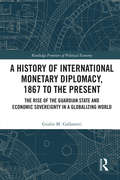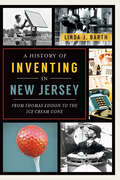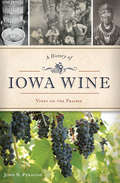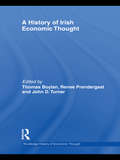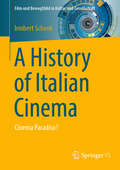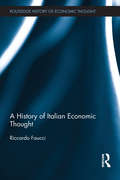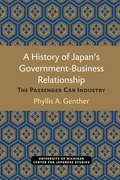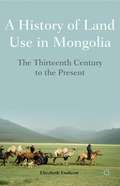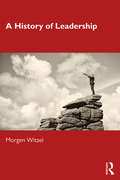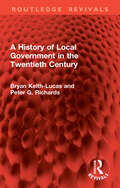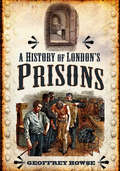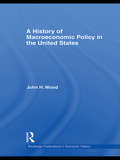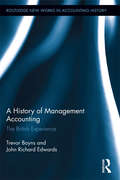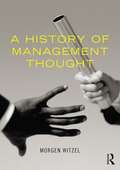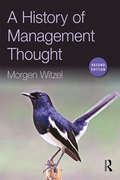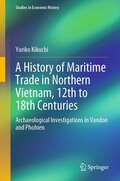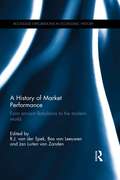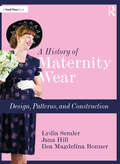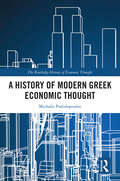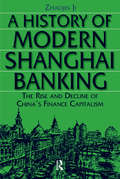- Table View
- List View
A History of International Monetary Diplomacy, 1867 to the Present: The Rise of the Guardian State and Economic Sovereignty in a Globalizing World (Routledge Frontiers of Political Economy)
by Giulio M. GallarottiThis book is about how the rise of democracy has transformed economics over the past 150 years. As voting was expanded to the masses in the late 19th century, political leaders faced emergent pressures to deliver prosperity to their newly enfranchised populations. This led to the rise of the guardian state: a state whose prime directive was to protect economic growth and employment. Domestic economic goals now became sacrosanct, and if that meant a failure on the international stage to construct solutions to problems in monetary relations, so be it. The book traces the history of international monetary diplomacy during this long period to show how the guardian state has manifested itself, and how it has shaped the course of international monetary relations. Each of the most important international monetary conferences in history is scrutinized with respect to how nations sought to protect the prosperity within their national economies. The historical narratives give a bird’s-eye view into how domestic political priorities have intruded on and shaped economic relations among nations. The book clearly demonstrates the advantages of an interdisciplinary understanding of how politics shapes economics. It will be invaluable reading for scholars and students of international economics, politics and economic history.
A History of Inventing in New Jersey: From Thomas Edison to the Ice Cream Cone
by Linda J. BarthMany Americans are familiar with Thomas Edison's "invention factory" in Menlo Park, where he patented the phonograph, the light bulb and more than one thousand other items. Yet many other ideas have grown in the Garden State, too--New Jerseyans brought sound and music to movies and built the very first drive-in theater. In addition to the first cultivated blueberry, tasty treats like ice cream cones and M&Ms are also Jersey natives. Iconic aspects of American life, like the batting cage, catcher's mask and even professional baseball itself, started in New Jersey. Life would be a lot harder without the vacuum cleaner, plastic and Band-Aids, and many important advances in medicine and surgery were also developed here. Join author Linda Barth as she explores groundbreaking, useful, fun and even silly inventions and their New Jersey roots.
A History of Iowa Wine: Vines on the Prairie (American Palate)
by John N. PeragineIowa has a history with grapevines that goes back more than a century. New York lawyer Hiram Barney obtained a tract of land in southeast Iowa as part of the Half-Breed program following the American Indian Wars and created the White Elk Winery. German settlers in Amana tended community vineyards for communal wines. Before Prohibition, the Council Bluffs Grape Growers Association grew grapes and shipped them eastward by the ton. In the early 1900s, the state was among the nation's top producers of grapes. Pesticides, weather and government subsidies ended the time of the vines of the prairie until their recent return. Author John N. Peragine details the rise, fall and resurgence of the industry in the Hawkeye State.
A History of Irish Economic Thought (The\routledge History Of Economic Thought Ser. #11)
by Thomas BoylanFor a country that can boast a distinguished tradition of political economy from Sir William Petty through Swift, Berkeley, Hutcheson, Burke and Cantillon through to that of Longfield, Cairnes, Bastable, Edgeworth, Geary and Gorman, it is surprising that no systematic study of Irish political economy has been undertaken. In this book the contributors redress this glaring omission in the history of political economy, for the first time providing an overview of developments in Irish political economy from the seventeenth to the twentieth century. Logistically this is achieved through the provision of individual contributions from a group of recognized experts, both Irish and international, who address the contribution of major historical figures in Irish political economy along the analysis of major thematic issues, schools of thought and major policy debates within the Irish context over this extended period.
A History of Italian Cinema: Cinema Paradiso? (Film und Bewegtbild in Kultur und Gesellschaft)
by Irmbert SchenkThis book provides a complete description of the development of Italian film and cinema from its beginnings in 1895 until today. Special emphasis is placed on those periods in which Italian film history became aesthetically decisive for world cinematography: silent film of the 1910s, neorealism after World War II, and auteur and genre cinema around 1960. And then on the multifaceted development up to the present day, which still guarantees films from Italy a significant place in international cinema. The chapters are introduced with compact descriptions of Italy's political and social history and the institutional formation of film and cinema. This is the basis for the extensive examination of genres and films. The film analyses also include a look at the reception by the audiences.
A History of Italian Economic Thought (The Routledge History of Economic Thought)
by Riccardo FaucciThis book provides the non-Italian scholar with an extensive picture of the development of Italian economics, from the Sixteenth century to the present. The thread of the narrative is the dialectics between economic theory and political action, where the former attempts to enlighten the latter, but at the same time receives from politics the main stimulus to enlarge its field of reflection. This is particularly clear during the Enlightenment. Inside, this book insists on stressing that Galiani, Verri, and Beccaria were economists quite sensitive to practical issues, but who also were willing to attain generally valid conclusions. In this sense, "pure economics" was never performed in Italy. Even Pareto used economics (and sociology) in order to interpret and possibly steer the course of political action. Within this book it illustrates the Restoration period (1815-48). There was a slowdown of the economists' engagement, due to an adverse political situation, that prompted the economists to prefer less dangerous subjects, such as the relationship between economics, morals, and law (the main interpreter of this attitude was Romagnosi). After 1848, however, in parallel with the Risorgimento cultural climate, a new vision of the economists' task was eventually manifested. Between economics and political Liberalism a sort of alliance was established, whose prophet was F. Ferrara. While the Historical school of economics of German origin played a minor role, Pure Economics (1890-1940 approx.) had a considerable success, as regards both economic equilibrium and the theory of public finance. Consequently, the introduction of Keynes's ideas was rather troubled. Instead, Hayek had an immediate success. This book concludes with a chapter devoted to the intense relationships between economic theories, economic programmes and political action after 1945. Here, the Sraffa debate played an important role in stimulating Italian economists to a reflection on the patterns of Italian economy and the possibilities of transforming Italy's economic and social structure.
A History of Italian Wine: Culture, Economics, and Environment in the Nineteenth through Twenty-First Centuries
by Paolo Tedeschi Manuel Vaquero Piñeiro Luciano MaffiThis book analyzes the evolution of Italian viticulture and winemaking from the 1860s to the new Millennium. During this period the Italian wine sector experienced a profound modernization, renovating itself and adapting its products to international trends, progressively building the current excellent reputation of Italian wine in the world market.Using unpublished sources and a vast bibliography, authors highlight the main factors favoring this evolution: public institutional support to viticulture; the birth and the growth of Italian wine entrepreneurship; the improvement in quality of the winemaking processes; the increasing relevance of viticulture and winemaking in Italian agricultural production and export; and the emergence of wine as a cultural product.
A History of Japan’s Government-Business Relationship: The Passenger Car Industry (Michigan Papers in Japanese Studies #20)
by Phyllis A. GentherDespite the economic and political importance of the U.S.-Japan relationship and the extensive attention paid to automotive trade, few American scholars or policy makers are familiar with the history of Japanese government-business relations, either generally or for specific industries such as passenger cars. This book hopefully helps in a small way to fill that gap in our knowledge and, thus, to help strengthen the foundation from which we make public policy decisions about bilateral trade. [ix]
A History of Land Use in Mongolia
by Elizabeth EndicottAn illustrated history of the pastoral nomadic way of life in Mongolia, this book examines the many challenges that Mongolian herders continue to face in the struggle over natural resources in the post-socialist free market era.
A History of Law and Lawyers in the GATT/WTO
by Gabrielle MarceauHow did a treaty that emerged in the aftermath of World War II and barely survived its early years evolve into one of the most influential organizations in international law? This unique book brings together original contributions from an unprecedented number of eminent current and former GATT and WTO staff members--including many current and former Appellate Body members--to trace the history of law and lawyers in the GATT/WTO and explore how the nature of legal work has changed over the institution's sixty-year history. It paints a fascinating portrait of the development of the rule of law in the multilateral trading system and allows some of the most important names in GATT and WTO history to share their stories and reflect on the WTO's remarkable journey from a "provisionally applied treaty" to an international organization defined by its commitment to the rule of law. This volume provides a new perspective on the role of law and lawyers in the GATT/WTO Secretariats that highlights the multiple roles of lawyers and non-lawyers in enhancing the rule of law in the multilateral trading system.
A History of Leadership
by Morgen WitzelThe evolution of leadership into a widely accepted concept occurred without any shared understanding and acceptance of its meaning and relevance in contemporary society. Why do some people become leaders? What is the source and legitimacy of leadership power? This book journeys into the heart of the relationship between leaders and followers, the social space and the arena where both contest and collaboration take place and leadership itself is played out. In the book, Morgen Witzel moves beyond traditional traits and skills framing, offering a fresh, historical analysis that involves many different actors with different motives and needs. By analysing the evolution of power relationships, the book analyses the interactions around how power is used and control is bargained for to illuminate the centrepiece of leadership. A wide-ranging history of a slippery subject, this book provides students, scholars and reflective practitioners with an empirical, historical base on which to test their own ideas and experiences.
A History of Local Government in the Twentieth Century (Routledge Revivals)
by Peter G. Richards Bryan Keith-LucasOriginally published in 1978, this book covers all aspects of the development of local authorities; the changing types of people who worked in them – solicitors, trade unionists, politicians and reformers; the growing influence of political parties in local affairs; the widening concept of the purpose of local government and the attendant financial problems; the partnership and conflict with central government; the rise of the associations of local authorities and their influence over the many proposals to change the structure of local government in the late 20th Century.
A History of London's Prisons
by Geoffrey HowseThe author of The A-Z of London Murders takes readers behind the bars of the city’s numerous jails and tells the tales of their most infamous inmates. London has had more prisons than any other British city. The City’s “gates” once contained prisons but probably the most notorious of all was Newgate, which stood for over seven hundred years. The eleventh-century Tower of London was used as a prison for a variety of high profile prisoners from Sir Thomas More to the Krays. Discover the background of a variety of historic places of incarceration such as the Clink, the King’s Bench Prison, and debtors’ prisons such as the Fleet Prison and the Marshalsea. “Lost” prisons such as the Gatehouse in Westminster, Millbank Penitentiary, Surrey County Gaol in Horsemonger Lane, the House of Detention, Coldbath Fields Prison, and Tothill Fields Bridewell Prison are also described in detail; as are more familiar jails: Holloway, Pentonville, Brixton, Wandsworth, and Wormwood Scrubs. In A History of London’s Prisons, Geoffrey Howse delves not only into the intricate web of historical facts detailing the origins of the capital’s prisons but also includes fascinating detail concerning the day-to-day life of prisoners—from the highly born to the most despicable human specimens imaginable—as well as those less fortunate individuals who found themselves through no fault of their own “in the clink,” some soon becoming clients of the hangman or executioner.
A History of Macroeconomic Policy in the United States (Routledge Explorations in Economic History)
by John H. WoodThis book examines the controlling influences that drive macroeconomic policies in the United States. It addresses the history of the interests, ideas, and practices of monetary and fiscal policies in the United States.
A History of Macroeconomics from Keynes to Lucas and Beyond
by Michel De VroeyThis book retraces the history of macroeconomics from Keynes's General Theory to the present. Central to it is the contrast between a Keynesian era and a Lucasian - or dynamic stochastic general equilibrium (DSGE) - era, each ruled by distinct methodological standards. In the Keynesian era, the book studies the following theories: Keynesian macroeconomics, monetarism, disequilibrium macroeconomics (Patinkin, Leijongufvud and Clower), non-Walrasian equilibrium models, and first-generation new Keynesian models. Three stages are identified in the DSGE era: new classical macroeconomics (Lucas), RBC modelling, and second-generation new Keynesian modeling. The book also examines a few selected works aimed at presenting alternatives to Lucasian macroeconomics. While not eschewing analytical content, Michel De Vroey focuses on substantive assessments, and the models studied are presented in a pedagogical and vivid yet critical way.
A History of Management Accounting: The British Experience (Routledge New Works in Accounting History)
by Richard Edwards Trevor BoynsThere is growing interest in the history of accounting amongst both accounting practitioners and accounting academics. This interest developed steadily from about 1970 and really ‘took off’ in the 1990s. However, there is a lack of texts dealing with major aspects of accounting history that can be used in classrooms, to inform new researchers, and to provide a source of reference for established researchers.The great deal of research into cost and management accounting in Britain published in academic journals over the last twenty years–including the authors' own contributions–makes The History of Cost and Management Accounting an essential contribution to the field.
A History of Management Thought
by Morgen WitzelFor the past three thousand years people have been thinking about the problems of management. This book shows how thinking about management has evolved and changed. It shows how changing social, political and technological forces have challenged people to think about management in new ways, and how management thinkers have responded. Sometimes their responses missed the mark and occasionally, great ideas about management failed to be picked up and were lost along the way. Sometimes, truly original and creative, even world-changing ideas appeared. Following key currents in management thought from the origins of civilization to the present day, the book begins in the ancient world, when people were wrestling with the problems of organization and leadership. It continues through the Middle Ages, east and west, as people pondered on how to manage risk and think strategically, and on the role of business in society. It shows how the Industrial Revolution led to the emergence of scientific management, and how political and social events of the twentieth century shaped management thinking right up to the present day. From the pyramids to Facebook, from military strategy to managing for sustainability, A History of Management Thought tells the fascinating story of how management thinking has changed, shifted, evolved and developed down through the centuries. Students taking classes in the history of management thought will find this text to be the perfect accompaniment to their studies and will be a captivating read for anyone else.
A History of Management Thought
by Morgen WitzelOf all the sciences and social sciences, management is the one that most deliberately turns its back on the past. Yet management as we know it today did not spring into life fully formed. Management has more than just a present; it also has a past, and a future, and all three are inextricably linked. This book charts the evolution of management as an intellectual discipline, from ancient times to the present day. Contemporary management challenges, including sustainability, technology and data, and legitimacy are analysed through an historical lens and with the benefit of new case studies. The author helps readers understand how the evolution of management ideas has interacted with changes in society. By framing management's history as one of challenge and response, this new edition is the perfect accompaniment for students and scholars seeking meaningful study in the business school and beyond. Essential reading as a core textbook in management history, the book is also valuable supplementary reading across the humanities and social sciences.
A History of Maritime Trade in Northern Vietnam, 12th to 18th Centuries: Archaeological Investigations in Vandon and Phohien (Studies in Economic History)
by Yuriko KikuchiThis book analyzes the role of Đại Việt (Vietnam) in the maritime Asian trading network of the thirteenth through the eighteenth centuries as it systematically integrates the results of archaeological investigations. The first half of the book consolidates reports from excavations conducted at Vân Đồn and Phố Hiến, trading ports of Đại Việt, incorporating sophisticated archaeological techniques distinctive of Japan in the presentations of the data. These are accompanied by precise scale drawings, detailed classifications, and quantitative analyses of unearthed artifacts. The latter half of the book discusses the materials discovered in archaeological investigations, specifically ceramics and coins, in terms of the relations among sites and networks of production, distribution, and consumption, from a broader Asian geohistorical perspective. To this end, the diplomatic policies and trading activities of each era in Vietnam are discussed, integrating the results of archaeological investigations with studies of historical documents. Expanding beyond Vietnam, results of the archaeological investigations in other maritime Asian countries, such as Japan, Indonesia, Laos, and the Philippines, are introduced, to inform a comparative study that combines all such data from both archaeology and history in a single volume as materials for broader discussion. This book is expected to contribute to international academic discourse on the history of maritime Asia and help open a new phase of scholarly endeavor in this field.
A History of Market Performance: From Ancient Babylonia to the Modern World (Routledge Explorations in Economic History)
by Jan Luiten van Zanden Bas Van Leeuwen R.J. van der SpekThis exciting new volume examines the development of market performance from Antiquity until the dawn of the Industrial Revolution. Efficient market structures are agreed by most economists to serve as evidence of economic prosperity, and to be prerequisites for further economic growth. However, this is the first study to examine market performance as a whole, over such a large time period. Presenting a hitherto unknown and inaccessible corpus of data from ancient Babylonia, this international set of contributors are for the first time able to offer an in-depth study of market performance over a period of 2,500 years. The contributions focus on the market of staple crops, as they were crucial goods in these societies. Over this entire period, all papers provide a similar conceptual and methodological framework resting on a common definition of market performance combined with qualitative and quantitative analyses resting on new and improved price data. In this way, the book is able to combine analysis of the Babylonian period with similar work on the Roman, Early-and Late Medieval and Early Modern period. Bringing together input from assyriologists, ancient historians, economic historians and economists, this volume will be crucial reading for all those with an interest in ancient history, economic history and economics.
A History of Maternity Wear: Design, Patterns, and Construction
by Lydia Semler Jana Hill Ilea Magdelina BonnerA History of Maternity Wear: Design, Patterns, and Construction explores pregnancy clothing worn throughout the decades, providing historical information, images, and patterns. Filled with photos showing extant attire, with intricate details and sample patterns that can be recreated to scale, this book examines how maternity clothes were constructed, provides historical context, and aids readers in designing their own maternity garments. Each chapter includes examples of commonly worn maternity styles from a number of regions of the English-speaking world, with information from the United States, Britain, Australia, and Canada. The book concludes with a chapter on historically accurate underpinnings from the 17th century to the present day. A History of Maternity Wear: Design, Patterns, and Construction is written for costume professionals looking to research historically accurate characters and costumes for production, as well as fashion historians and costume enthusiasts.
A History of Maternity Wear: Design, Patterns, and Construction
by Lydia Semler Jana Hill Ilea Magdelina BonnerA History of Maternity Wear: Design, Patterns, and Construction explores pregnancy clothing worn throughout the decades, providing historical information, images, and patterns.Filled with photos showing extant attire, with intricate details and sample patterns that can be recreated to scale, this book examines how maternity clothes were constructed, provides historical context, and aids readers in designing their own maternity garments. Each chapter includes examples of commonly worn maternity styles from a number of regions of the English-speaking world, with information from the United States, Britain, Australia, and Canada. The book concludes with a chapter on historically accurate underpinnings from the 17th century to the present day.A History of Maternity Wear: Design, Patterns, and Construction is written for costume professionals looking to research historically accurate characters and costumes for production, as well as fashion historians and costume enthusiasts.
A History of Modern Greek Economic Thought (The Routledge History of Economic Thought)
by Michalis PsalidopoulosTracing the evolution of economic ideas in the context of the economic history and economic policy issues in Greece, this book examines the history of modern Greek economic thought from the War of Independence from Ottoman rule in 1821 until the present.The book explores how native, religious-oriented economic thought was secularized and merged with different economic discourses during successive historical periods. It traces how the dissemination of French and German economic thought in the 19th century was followed by British and US influences in the 20th century. The institutionalization of economics as a discipline in the 1920s and its internationalization after 1971, with their effects on the emergence of modern mainstream and heterodox thought, are also discussed. Finally, reference is made to contemporary Greek economic thought in the frame of European Union economic thinking.This book will be of interest to readers in the history of economic thought, economic history, intellectual history, Greek history, and modern European history more broadly.
A History of Modern Shanghai Banking: The Rise and Decline of China's Financial Capitalism (Studies On Modern China Ser.)
by Ji ZhaojinAs the center of capitalism in China, Shanghai banking provides a unique perspective for assessing the impact of the changes from financial capitalism to socialist planning banking in the early 1950s, and for evaluating the reform of China's banking system since the 1980s. This book offers a comprehensive history of Shanghai banking and capital markets from 1842 to 1952, and illustrates the non-financial elements that contributed to the revolutionary social and financial changes since the 1950s, as well as financial experiences that are significant to China's economic development today. The book describes the rise and fall of China's traditional native banks, the establishment of foreign banks, and the creation of modern state banks, while focusing on the colorful world of banking, finance, and international relations in modern Shanghai. It assesses the Chinese government's intervention in banking and finance during the Qing dynasty and the Republican era, as well as the concept of state capitalism after the establishment of the People's Republic. The author examines various modern-style Chinese banks through fascinating stories of Shanghai bankers. In addition, she provides detailed coverage of market-oriented international trade, banking associations, the conflicts between state and society, the government involvement in business, the management of foreign exchange, joint venture banks, wartime banking and finance, hyperinflation, corruption, and banking nationalization.
A History of Monetary Unions (Routledge International Studies In Money And Banking Ser. #Vol. 21)
by John F ChownIn this comprehensive historical overview, the author writes about monetary unions with an admirable completeness and covers such themes as:*The Gold Standard*Monetary Unions in Countries and Areas from Latin America to The British Empire to Japan and Korea with many in between*EMU and its Policy Ramifications*the CFA Franc Zone in the former Frenc
